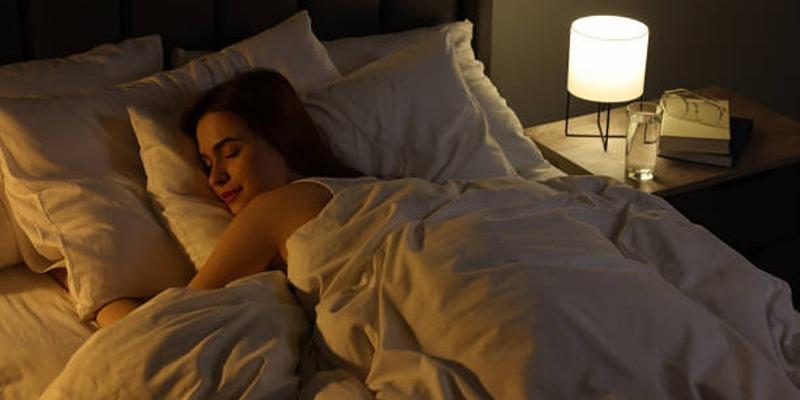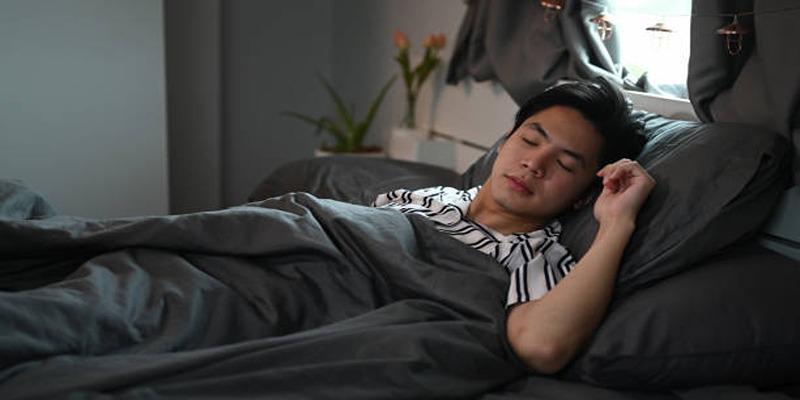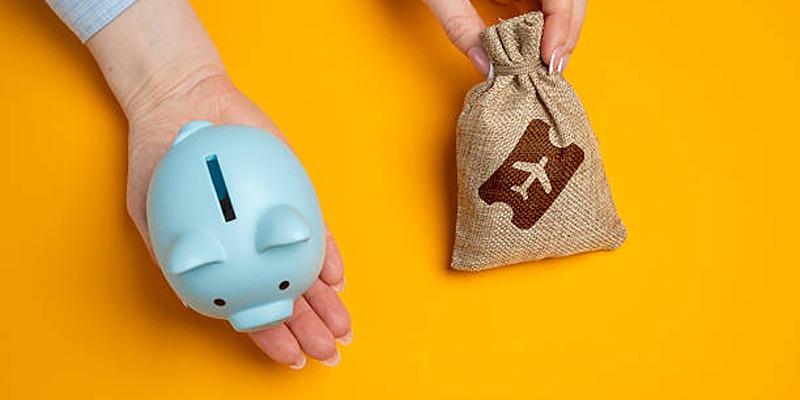Hot nights can make restful sleep feel impossible, leaving you tossing and turning in discomfort. Staying cool is the key to a good night’s sleep, and with a few practical tips, you can beat the heat. From adjusting your environment to improving your habits, these strategies will help you sleep comfortably all summer long.

Your choice of bedding plays a critical role in regulating body temperature during sleep. Opt for materials that promote airflow and wick away moisture. Natural fibers like cotton, linen, and bamboo are breathable and allow heat to dissipate, keeping your body cooler throughout the night.
Avoid synthetic fabrics like polyester and microfiber that can trap the heat and also obstruct the air circulation. With regard to your mattress, memory foam can sleep hot but it’s not a deal breaker since there turn around to use cooling toppers or gel-infused pads to help control that temperature.
Tip: Wash your bedding regularly in cool water and avoid heavy comforters or blankets during warmer months. Lightweight quilts or breathable coverlets are ideal alternatives.
Preparing your room in advance can dramatically impact your comfort level once you get into bed. Close curtains, blinds, or shades during the day to block out direct sunlight, which can raise the room’s internal temperature.
In the evening, open windows if outdoor temperatures have dropped. Use an oscillating fan or portable air cooler to circulate the air and bring in a refreshing breeze. Position the fan across from an open window to create cross ventilation, encouraging hot air to exit and cooler air to enter. For extra cooling power, place a bowl of ice water in front of the fan. The air will flow over the ice and distribute a chilled breeze across the room.
What you wear to bed directly affects your ability to stay cool. Choose loose-fitting pajamas made from breathable fabrics such as cotton or modal. These materials allow your skin to breathe and help sweat evaporate more efficiently, keeping your body temperature stable.
Wearing too many layers or restrictive clothing can trap heat and increase discomfort. If the temperature is particularly high, consider wearing minimal clothing or sleep in a lightweight cotton tank top and shorts.
Hydration is important for your body’s ability to regulate temperature, especially in the heat. Drink water consistently throughout the day, and not just at night, to maintain internal cooling systems. Staying hydrated helps your body release heat through sweating and proper circulation.
However, avoid consuming large amounts of fluids immediately before going to bed. Doing so can lead to waking up multiple times during the night to use the bathroom, interrupting your sleep cycle.
Contrary to popular belief, a lukewarm shower is more effective than a cold one before bed. A lukewarm shower helps to lower your body’s core temperature gradually, triggering your natural sleep mechanisms and helping you feel more relaxed.
The process removes sweat, grime, and any residual heat from your skin, setting the stage for a more comfortable night’s sleep. The gentle temperature drop after stepping out of a lukewarm shower mimics the body's natural cooling trend during sleep onset.
The position in which you sleep can significantly influence your comfort. Lying in a spread-out position, such as on your back with arms and legs open, increases your surface area and allows more heat to escape from your body.
Avoid curling up tightly, as this restricts airflow and traps heat. Also, try to avoid sharing your bed on hot nights if possible. Body heat from another person can contribute to an already warm environment. If you have to share a bed, consider using separate blankets or sheets to minimize retained heat.
Your pillow can be a hidden culprit of nighttime heat. Traditional pillows trap heat around your head and neck, making it difficult to stay cool. Switch to a cooling pillow that features breathable materials or gel layers that dissipate heat quickly.
Additionally, invest in temperature-regulating sheets made from moisture-wicking fabrics. Cooling mattress pads can also be effective in drawing heat away from your body, especially if your mattress retains warmth.
Even without air conditioning, you can create a powerful cooling effect using a simple fan setup. Open two windows across from each other in your room or adjacent rooms and position fans near them to direct airflow. This setup encourages natural ventilation, pulling cooler air in and pushing warmer air out.
In multi-story homes, opening windows on both levels can allow warm air to rise and escape, naturally cooling your space from the bottom up. Also, keep closet and bathroom doors open to allow warm air to circulate out of the room instead of becoming trapped.
Many people overlook the heat generated by electronics and appliances. Computers, televisions, and even lightbulbs emit warmth that can raise your room’s temperature. Try to limit the use of electronics in your bedroom, especially during the evening.
Switch to energy-efficient LED lights, which emit significantly less heat than traditional bulbs. Unplug devices you are not using, as some electronics continue to generate heat even in standby mode.
Additionally, avoid cooking or baking late in the day if your kitchen shares space with or is near your sleeping area, as this can add extra warmth to your home.

A simple yet effective method involves applying cool compresses to key pulse points. Dampen a washcloth, chill it in the refrigerator or freezer for a few minutes, then gently place it on areas like your wrists, ankles, neck, or forehead. These spots are highly sensitive to temperature changes and help cool the body rapidly.
You can also use a soft ice pack wrapped in a cloth to achieve a similar effect. Just ensure it's not too cold or in direct contact with your skin for prolonged periods. For an overnight solution, lightly mist your top sheet with water and run a fan to create an evaporative cooling effect.
Hot nights shouldn’t rob you of your rest. While warm weather is beyond your control, your response to it isn’t. By adjusting your environment, habits, and sleep setup, you can drastically improve how well you sleep even when the temperature outside is less than ideal. Each of these strategies is practical, safe, and easy to implement. Whether you adopt just a few or all ten, the key is consistency. These changes can result in better sleep quality, improved mood, and greater energy during the day.

Discover how hostels make budget travel affordable, social, and unforgettable.

Discover smart and easy ways to explore your dream destinations on a budget.

Explore top travel destinations blending culture, nature, and sustainability.

Balanced nutrition supports brain health and mood. Discover how diet affects emotional well-being and mental resilience.

Laser eye surgery guide detailing types, risks, recovery process, candidacy factors, and costs for improved vision.

Discover 10 science-backed strategies to optimise health, enhance wellness, and maintain long-term vitality naturally.

A 40-year study reveals that weight loss surgery lowers early death risk, offering long-term health and survival benefits.

Busy parents can enjoy the holidays with quick, healthy meals that save time, reduce stress, and support family wellness.

Learn the types, causes, and treatments for headaches, and discover when it’s time to consult a healthcare professional.

Is it safe to travel to Sicily after Mount Etna’s eruption? Here’s the latest safety advice, alerts, and travel tips for visitors

Bangkok, Lima, Lyon, Wellington, Osaka, and Lucknow are the top food capitals of the world that serve you the best local flavors

Get updated travel safety tips and real-time alerts for Bali tourists following the recent volcano eruption and ash disruptions